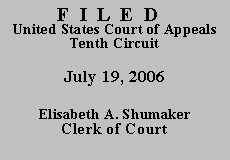

| UNITED STATES OF AMERICA,
v.
DENISE SOUSER |
No. 05-1500
(D.C. No. 03-CR-00411-MSK) (D. Colo.) |
See United States v. Souser, 405 F.3d 1162 (10th Cir. 2005). On remand, the district court held a sentencing hearing and ultimately granted the Probation Office's request to restore the disputed condition.
Souser now appeals the district court's decision to reimpose the disputed condition. Under U.S.S.G. § 5F1.5(a)(2), the district court may impose an employer-notification condition on employment if, absent notification, the defendant will continue to engage in unlawful conduct similar to that for which she was convicted. This requirement was satisfied, the district court found, because Souser's refusal to tell her employer about her present conviction constituted concealment of a fact similar to the conduct which lead to her conviction in this case. On appeal, the United States concedes that this finding does not satisfy § 5F1.5(a)(2). Specifically, the Government agrees with Souser that the district court placed Souser in a Catch-22, effectively telling her that "your failure to reveal your conviction shows me that I need to order you to tell your employer." The Government therefore maintains that the condition should be vacated and the case be remanded for de novo resentencing. We agree.
Souser's sentence is VACATED and the case is REMANDED for resentencing.
ENTERED FOR THE COURT
Carlos F. Lucero
Circuit Judge
*. The case is unanimously ordered submitted without oral argument pursuant to Fed. R. App. P. 34(a)(2) and 10th Cir. R. 34.1(G). This order and judgment is not binding precedent, except under the doctrines of law of the case, res judicata, and collateral estoppel. The court generally disfavors the citation of orders and judgments; nevertheless, an order and judgment may be cited under the terms and conditions of 10th Cir. R. 36.3.
1. U.S.S.G. § 5F1.5, entitled "Occupational Restrictions," provides in relevant part:
(a) The court may impose a condition of probation or supervised release prohibiting the defendant from engaging in a specified occupation, business, or profession, or limiting the terms on which the defendant may do so, only if it determines that:
(1) a reasonably direct relationship existed between the defendant's occupation, business, or profession and the conduct relevant to the offense of conviction; and
(2) imposition of such a restriction is reasonably necessary to protect the public because there is reason to believe that, absent such restriction, the defendant will continue to engage in unlawful conduct similar to that for which the defendant was convicted.